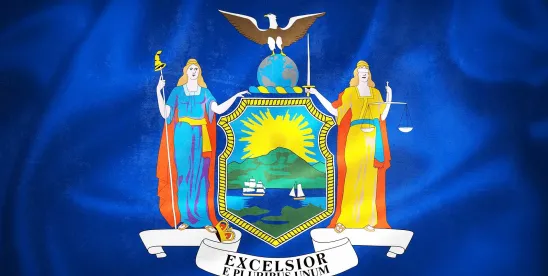KEY UPDATE
On October 20, 2024, two new laws will take effect in New York that impact how healthcare providers obtain consent to payment and collect payments from patients. These laws will affect all providers, particularly those who maintain patients’ credit card information on file, including many digital health providers. Although no regulations or guidance have been issued or proposed to date on how to implement these laws, and therefore significant ambiguities remain, providers who render services to patients located in New York should be aware of these changes and assess their consent and billing processes for compliance.
WHY IT MATTERS
- Effective October 20, 2024, two new laws will impact how healthcare providers in New York collect payment from patients. Specifically, healthcare providers:
- Must collect consent for payment separate from consent to receive healthcare services; such consent to payment cannot occur prior to the patient receiving services and discussing treatment costs.
- Are prohibited from requiring credit card pre-authorization or requiring a patient’s credit card be kept on file prior to the delivery of “emergency or medically necessary services.”
- Must notify patients of the risks of using credit cards to pay for healthcare services.
- Although these laws apply to all healthcare providers in New York, they may particularly impact digital health providers’ payment practices.
- Significant ambiguities and uncertainties remain regarding the laws, and no guidance has been issued to date.
- Healthcare providers should assess their current consent and billing processes and determine changes necessary to comply with the laws. They also should develop notifications regarding the risks of paying for medical services with credit cards.
In Depth
BACKGROUND
The two new laws were enacted as part of New York’s fiscal year 2024 – 2025 budget.
Requirements for Patient Consent to Payment
NY Public Health Law (PHL) § 18-c provides (1) that a patient’s consent to pay for healthcare services must be obtained separately from the informed consent for such healthcare services, and (2) that consent to payment may only be obtained after the patient has received the applicable services and discussed treatment costs.
The statute does not expressly state to whom it applies; it refers only to “patients” and not to any category of healthcare providers. It is also unclear whether a patient must provide new consent each time a different service is offered, and whether multiple consents are necessary for a course of treatment. The Medical Society of the State of New York and several medical specialty organizations recently sent a letter to the New York State Department of Health (DOH) expressing the logistical and operational challenges that the PHL § 18-c requirements pose to medical practices, and urging that the law be revised to allow consent prior to the provision of services.
Requirements for Credit Card Payments for Healthcare Services
NY General Business Law (GBL) § 519-a prohibits hospitals and healthcare providers from (1) requiring credit card pre-authorization and (2) requiring that a credit card be kept on file prior to “providing emergency or medically necessary medical services” to the patient.
GBL § 519-a’s requirements apply to emergency and “medically necessary” services. The statute does not define “medically necessary,” although the phrase could be read broadly to encompass any service that is not solely for a patient’s convenience or for a cosmetic, experimental, or investigational purpose, or is not reimbursable by insurance. Unlike PHL § 18-c, however, the statute does define “healthcare providers,” and does so broadly to encompass all providers of healthcare services.
GBL § 519-a also requires hospitals and healthcare providers to notify all patients about the risks of paying for medical services with a credit card. Such notification must highlight the fact that by using a credit card to pay for medical services, the patient is foregoing state and federal protections regarding medical debt. The law gives DOH the authority and sole discretion to set requirements for the contents of such notices; DOH has not issued any such requirements or further guidance as of the date of this alert.
OPEN QUESTIONS AND NEXT STEPS FOR HEALTHCARE PROVIDERS
As described above, significant ambiguities and uncertainties remain regarding PHL § 18-c and GBL § 519-a’s requirements. Taken together, PHL § 18-c and GBL § 519-a seemingly indicate that a healthcare provider cannot take payment or payment information until after the services are rendered, at which point the patient may decline to consent to pay for the services.
To date, no regulations or guidance has been proposed or issued to help providers understand their obligations under these new laws. In the absence of guidance, it is unclear how New York will enforce the requirements of PHL § 18-c and GBL § 519-a. Nonetheless, the DOH and the New York Attorney General have authority to enforce compliance with the Public Health Law, and the Attorney General has authority to enforce compliance with the General Business Law. Healthcare providers should be aware that penalties exist for noncompliance with both statutes regardless of further regulations or guidance.
Providers should assess their current consent and billing processes and determine how they may need to change to comply with the new laws. For example, providers that utilize a single consent form combining informed consent for services and consent to payment should update their forms to obtain separate consents for treatment and payment, and should think through how the consent to payment can be delivered after the patient receives treatment and treatment costs are discussed. Providers should also take steps to develop patient notifications regarding risks of paying for healthcare services with a credit card, in line with the requirements of GBL § 519-a, while awaiting guidance from DOH on specific requirements for such notices. Providers should assess the impact of these new requirements in conjunction with other requirements, such as those under the federal No Surprises Act, other New York state laws, and payor contracts, which require upfront disclosure of costs to patients and may conflict with certain provisions of these new requirements.






 />i
/>i

